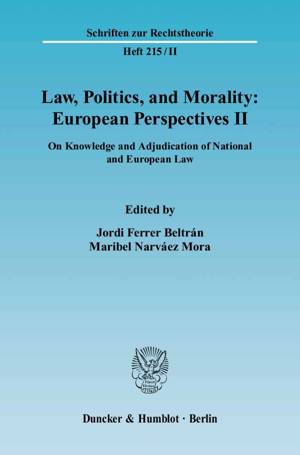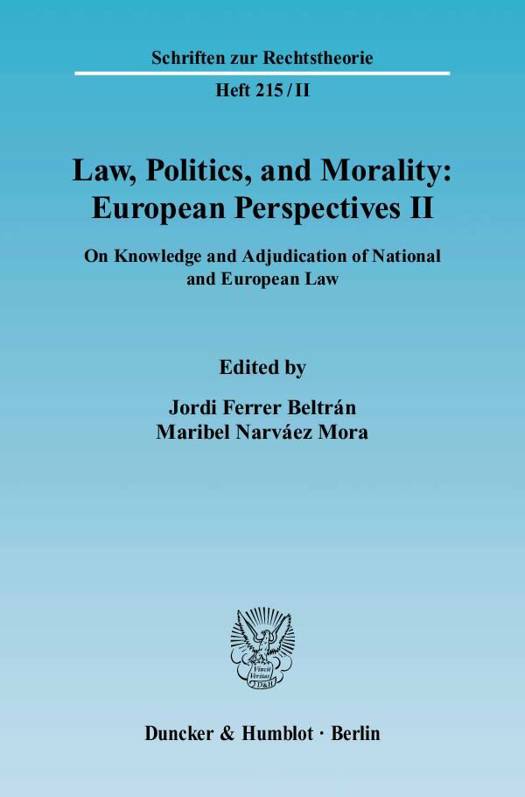
Bedankt voor het vertrouwen het afgelopen jaar! Om jou te bedanken bieden we GRATIS verzending (in België) aan op alles gedurende de hele maand januari.
- Afhalen na 1 uur in een winkel met voorraad
- In januari gratis thuislevering in België
- Ruim aanbod met 7 miljoen producten
Bedankt voor het vertrouwen het afgelopen jaar! Om jou te bedanken bieden we GRATIS verzending (in België) aan op alles gedurende de hele maand januari.
- Afhalen na 1 uur in een winkel met voorraad
- In januari gratis thuislevering in België
- Ruim aanbod met 7 miljoen producten
Zoeken
Law, Politics, and Morality: European Perspectives II.. Vol.2
On Knowledge and Adjudication of National and European Law.
€ 63,95
+ 127 punten
Omschrijving
Teaching and study of law is based on the premises of formal dogma. Discussion centres on what the law says, and less on the Instruments enabling its application, such as legal argumentation and reasoning.
The approach to the new legal and institutional challenges facing the European Union is not immune to this problem. Little public attention is paid to actual law emanating from EU institutions, and even less to its application. However, at least three issues of vital importance can easily be seen to originate in this field: (1) Does legal harmonisation among EU countries also mean harmonisation of criteria and forms of justification of judicial reasoning? (2) What is the relationship between each country's internal laws and European law at the application stage? And (3) what is the relationship between the application of law by European-level legal bodies and national bodies, which may, for example, assume differing levels of protection of individual rights?
These and other questions concerning application of the law in the European Union were the objective of a European congress, The Judiciary and its Role in the European Construction Process, held in Girona, Spain, from 14 to 16 November 2002. The congress was funded by the European Commission via the Human Potential Programme within the European Community's 5th Framework Programme. It was part of the PhD Euroconferences in Legal Philosophy: Current Challenges to the European Legal Thought project. This book brings together the results of that congress, yet cannot be termed Proceedings, since the papers presented at the congress were later modified by the authors in light of the discussion.
The approach to the new legal and institutional challenges facing the European Union is not immune to this problem. Little public attention is paid to actual law emanating from EU institutions, and even less to its application. However, at least three issues of vital importance can easily be seen to originate in this field: (1) Does legal harmonisation among EU countries also mean harmonisation of criteria and forms of justification of judicial reasoning? (2) What is the relationship between each country's internal laws and European law at the application stage? And (3) what is the relationship between the application of law by European-level legal bodies and national bodies, which may, for example, assume differing levels of protection of individual rights?
These and other questions concerning application of the law in the European Union were the objective of a European congress, The Judiciary and its Role in the European Construction Process, held in Girona, Spain, from 14 to 16 November 2002. The congress was funded by the European Commission via the Human Potential Programme within the European Community's 5th Framework Programme. It was part of the PhD Euroconferences in Legal Philosophy: Current Challenges to the European Legal Thought project. This book brings together the results of that congress, yet cannot be termed Proceedings, since the papers presented at the congress were later modified by the authors in light of the discussion.
Specificaties
Betrokkenen
- Uitgeverij:
Inhoud
- Aantal bladzijden:
- 226
- Taal:
- Engels
- Reeks:
Eigenschappen
- Productcode (EAN):
- 9783428109456
- Uitvoering:
- Paperback
- Afmetingen:
- 233
- Gewicht:
- 306 g

Alleen bij Standaard Boekhandel
+ 127 punten op je klantenkaart van Standaard Boekhandel
Beoordelingen
We publiceren alleen reviews die voldoen aan de voorwaarden voor reviews. Bekijk onze voorwaarden voor reviews.








